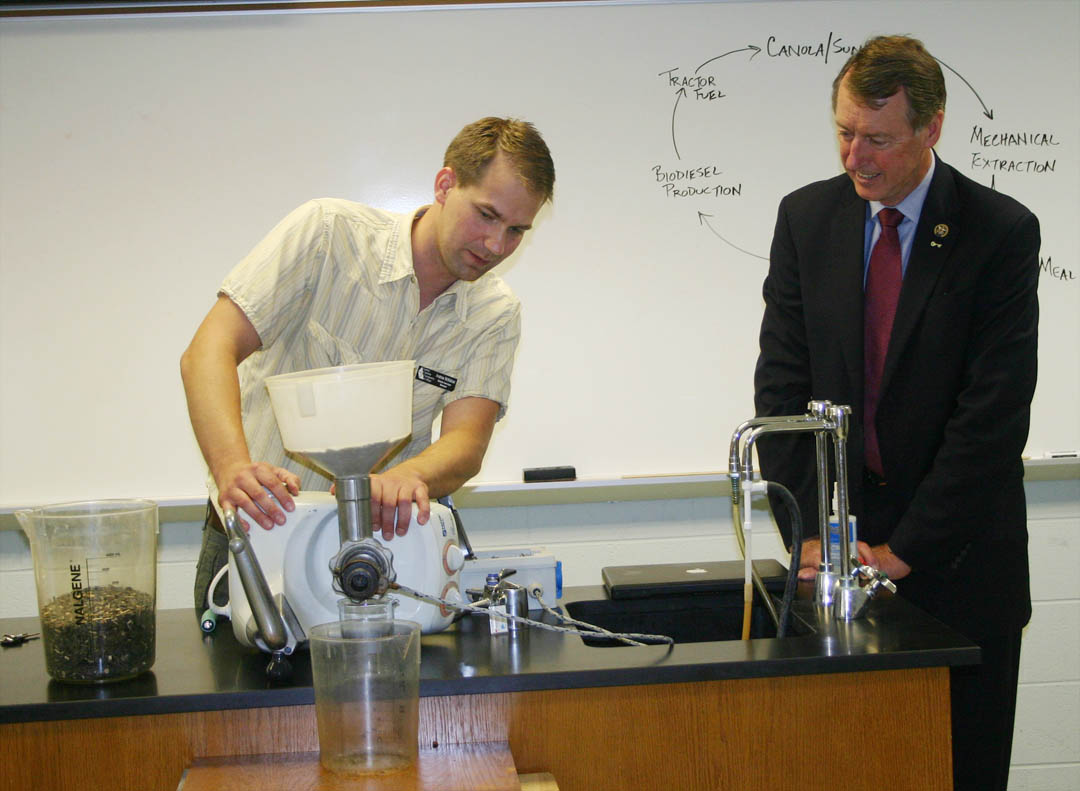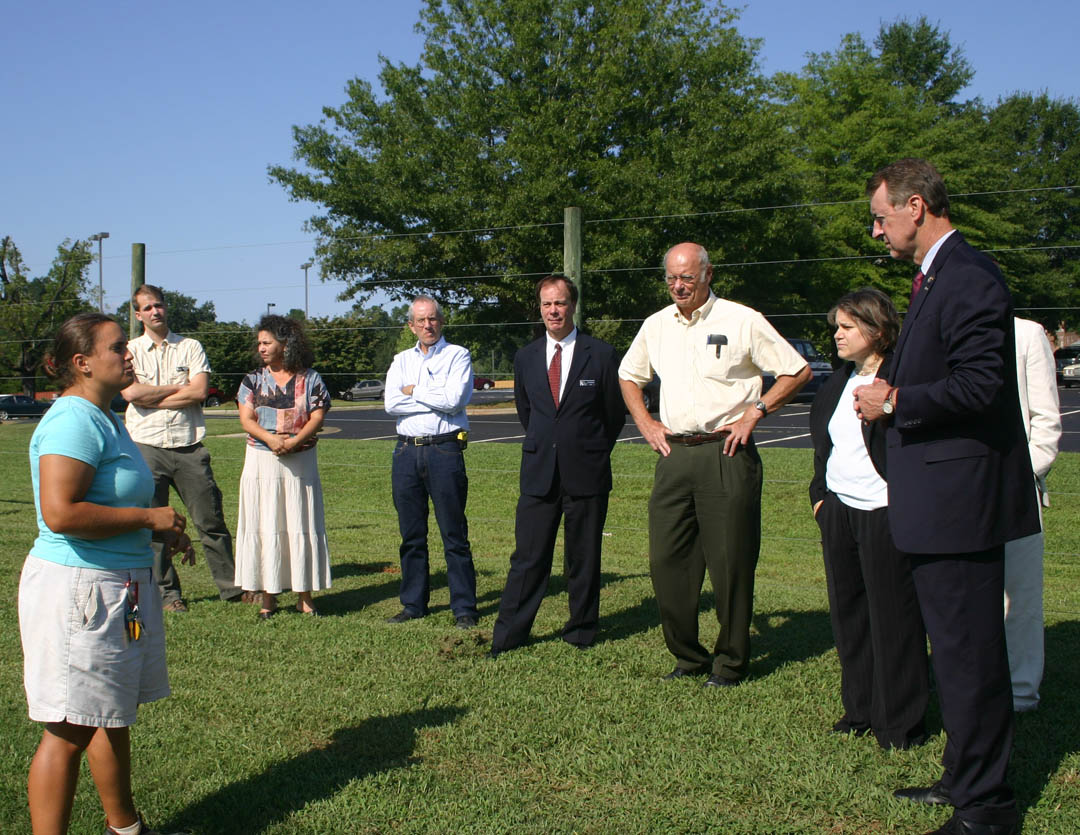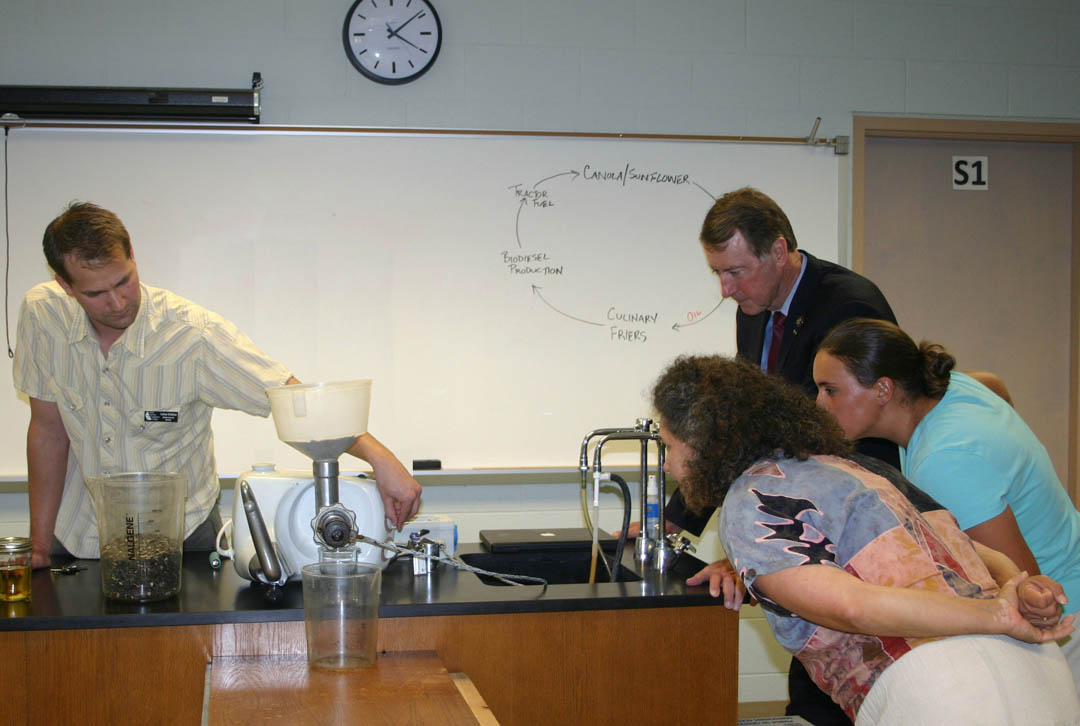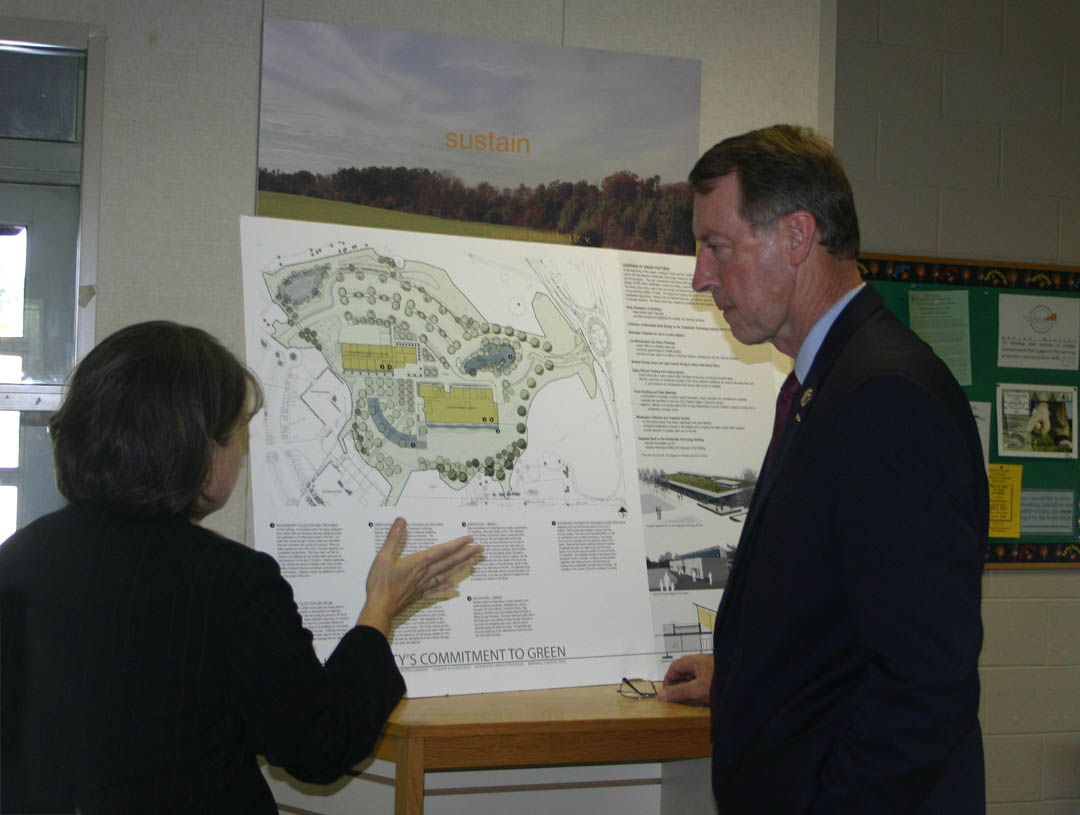
College News
Etheridge sees green at Central Carolina Chatham Campus
09.04.2009 • College & Community, College General, Special Events
PITTSBORO – Congressman Bob Etheridge was in his native element Sept. 1 as he toured the green programs at Central Carolina Community College’s Chatham County Campus.
Etheridge saw the excavation underway to build the college’s Sustainable Technologies Building and the Chatham Community Library, watched the making of a biofuel, and toured the land lab of the sustainable farming program.
“This is really exciting,” he said. “That’s what the community college system is about, not only telling, but showing; not only showing, but doing.”
Etheridge was raised on a farm in Johnston County and lives in Harnett County, where he is still a part-time tobacco farmer. With this background, he conversed knowledgeably with college faculty and administrators about what is happening in the green programs at the campus.
The buildings under construction have been designed for energy efficiency and are on-track to be eligible for a Gold Standard rating, or higher, from the U.S. Green Building Council. They will share an integrated water system that recycles rain and wastewater. The Sustainable building will have a living roof of vegetation to further improve energy efficiency. Both projects are funded by Chatham County and scheduled for completion in fall 2010.
Laura Lauffer, the college’s green building program coordinator, said that the college has a plan to bring the Chatham Campus to a “net-zero” energy use, consuming no more than it produces. Etheridge suggested the college apply for federal funding that is available for energy efficient projects through the farm bill, American Recovery and Reinvestment Act, and from the Energy Department.
In the biofuels laboratory, program coordinator Andrew McMahan described the new closed-loop biofuels production and use project the program is instituting. Canola and sunflower seeds will be grown at the sustainable agriculture land lab. The oil will be extracted, with the dry meal used for animal feed and the oil used in the coming culinary arts program. After the culinary arts program has used it, the oil will be cleaned and used as fuel in the land lab’s tractor, completing the loop.
“This is not being done anywhere else, even at the university level,” McMahan said.
Etheridge responded, “This is exciting, neat. Brazil is already producing large quantities of oil from biofuels sources and selling it to Europe. As a nation, we’re getting there.”
At the land lab, manager Hilary Heckler and instructor John Delafield talked about the eight-year land use rotation, summer crops, chickens, and beehives. The land lab has healthy bee colonies, but Etheridge expressed concern that the nation’s bees are dying off.
“If we lose the bees, we lose food production,” he said. “Something is affecting their communication systems.”
College President Bud Marchant and Chatham County Provost Karen Allen updated Etheridge on the leadership of the college and campus in green education, training people in farming, fuel, and construction that is environmentally sound, energy efficient, and consumer friendly.
In 2002, Central Carolina became the first community college in the nation to offer an Associate in Applied Science degree in Sustainable Agriculture. It is still the only community college in North Carolina offering an Associate in Applied Science in Alternative Energy Technology: Biofuels. The North Carolina Community College System recently selected it to offer weatherization faculty training. The college also has an ecotourism program and will be offering culinary arts based on sustainable agriculture. For all this, it has been dubbed, “Green Central.”
George Lucier, chairman of the Chatham County Board of Commissioners and college trustee, was also on the tour.
“I’m just excited about all the things going on at Central Carolina with sustainable technology, green technology,” he told Etheridge. “It’s the wave of the future.”
As the tour wound down, Etheridge said, “This campus is absolutely on the forefront of green education, helping to train the next generation of leaders ready to take their place in a green economy. They’ll be the ones to move us to sustainable growth.”
William Munn, Etheridge’s district representative, also took part in the tour. At the end of the visit, Etheridge took off his suit jacket and climbed into his white pick-up truck.
“Now, I’m going to head for my farm,” he said with a smile.

Congressman Bob Etheridge (right) visited Central Carolina Community College’s Chatham County Campus Sept. 1 to receive an update on the college’s green programs. One of his stops was the college’s biofuels lab, where Andrew McMahan, biofuels program coordinator, demonstrated the extraction of oil from canola seed. The seed is being used in a closed-loop biofuels production and use project. Canola and sunflower seed will be grown at the sustainable agriculture program’s land lab at the campus. The oil will be extracted, with the dry meal used for animal feed and the oil used in the coming culinary arts program. After the culinary arts program has used it, the oil will be cleaned and used as fuel in the land lab’s tractor, completing the loop. Etheridge said the college is in the forefront of training the workforce for the coming green economy.

Congressman Bob Etheridge (front, right) visited Central Carolina Community College’s Chatham County Campus Sept. 1 to receive an update on the college’s green programs. Hilary Heckler (front left), land lab manager, explains the sustainable agriculture program. Also taking part in the visit were (back, from left) Andrew McMahan, biofuels program coordinator; Laura Lauffer, green building program coordinator; John Delafield, sustainable agriculture instructor; college President Bud Marchant; George Lucier, chairman of the Chatham County Board of Commissioners and a college trustee; Chatham Provost Karen Allen; and (behind Etheridge) William Munn, the Congressman’s district representative. Etheridge also visited the biofuels lab and saw the excavation for the new Sustainable Technologies Building and Chatham Community Library.

Congressman Bob Etheridge (back, right) visited Central Carolina Community College’s Chatham County Campus’s green programs Sept. 1 and was impressed by what he saw. In the biofuels lab, Andrew McMahan (left), biofuels coordinator, demonstrates the making of oil from canola seeds. Getting a close look at the process are (from front, right) Laura Lauffer, the college’s green building program coordinator; Hilary Heckler, land lab manager; and Etheridge. He also visited the land lab and saw the excavation for the new Sustainable Technologies Building and Chatham Community Library.

Congressman Bob Etheridge (right) visited Central Carolina Community College’s Chatham County Campus Sept. 1 to receive an update on the college’s green programs. Karen Allen, the college’s provost for Chatham County, talked about the new Sustainable Technologies Building and Chatham Community Library, shown on an architect’s rendering of the campus. Both buildings are being constructed to high energy efficiency standards. The congressman also saw the college’s biofuels laboratory and the sustainable agriculture land lab. He said the college is in the forefront of training the workforce for the coming green economy.
- Central Carolina Community College
- Serving Chatham, Harnett, & Lee Counties, NC
- 1-800-682-8353




